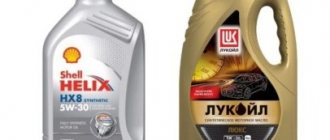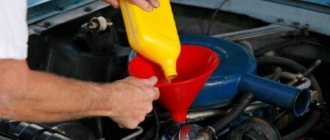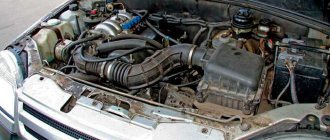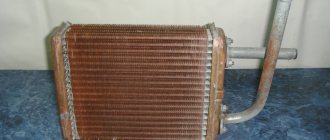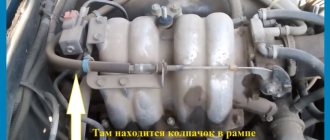The selection of engine oil is carried out based on the requirements and recommendations of the manufacturer, as well as based on reviews of the quality of a particular brand.
Next, we will look at what kind of oil to pour into the Chevrolet Niva in order to maximize the operating time of its engine and avoid unnecessary expensive repairs.
As for the lubricant itself, it is a combination of base oils with groups of additives that provide it with the necessary properties and characteristics. Oil covers all engine parts with a protective film , protecting them from wear and contamination. The longer these qualities remain unchanged, the better the protection will be throughout the entire service life.
What kind of oil to fill in the Niva Chevrolet engine
Before choosing a lubricant for Niva Chevrolet, you need to carefully read the vehicle data sheet. According to this document, oil with viscosity values from 0W-30 to 15W-40 is poured into the engine. Any type of product will work for this car.
There is no mineral lubricant among the original Lada oils.
Main selection criteria
When choosing a lubricant for an internal combustion engine, you need to consider 3 main factors:
- manufacturer's recommendations;
- age and condition of the engine;
- climatic features of the area where the car is operated.
The owner of a new Chevy Niva can choose almost any lubricant depending on his financial capabilities and preferences. If the car has been in use for a long time, you should fill in the type and class of oil that was used before. It is not recommended to suddenly switch from a mineral product to a synthetic one.
Shell
Shell is a leading specialist in the production of synthetic oils. For the Niva model, the Shell Ultra, Shell Helix Plus Ultra and others series of oils are suitable. In general, this oil is suitable for cars of any class. The lubricant in question has a special protection technology and is made with various innovative additives. Together with them, the engine components are lubricated and cleaned much faster. Shell oil is recommended for use in cold climates and in severe road conditions.
Selection of oil for the Niva Chevrolet engine
There is also a truth in this story that there are as many opinions on this matter as there are people in the world. This is, of course, exaggerating. But there is some truth in this joke. Some people change their engine oil after five thousand kilometers, others drive the same product three times longer, and their replacement interval occurs only after fifteen thousand kilometers. There are other people who change the engine filler every ten thousand kilometers. There are many variations on this theme.
But the truth is that when it comes to changing the oil, you can’t spoil the porridge with oil, so to speak. Frequent replacement is better than infrequent replacement. But everything determines the capabilities of each car enthusiast individually. Well, there’s little point in replacing it every thousand kilometers, of course, there’s no point.
The most important thing in this story, as all car owners say, is not to run into the wrong oil. Everything else is secondary. Buy motor oil in trusted places, preferably having read all the necessary documentation confirming the quality of the products that are sold to you at a specific retail outlet.
If this is not possible, then the operation can be performed at a car service station. The procedure is simple and does not cost a lot of money. The only point is to do the specified procedure in a trusted place. Because there are situations when dubious services partially drained the used oil, added some new oil, and that’s it.
https://www.youtube.com/watch?v=ZZd6-ggZs70
These cases are rare, but they do occur, therefore, you should not completely exclude them; if possible, you can attend the oil change procedure to remove such a risk.
Keep in mind that motor lubricant can significantly reduce the friction between moving elements in the motor. Also, automotive lubricant prevents the penetration of the air mixture into the main components of the car engine - for this reason, their rusting is completely eliminated.
It is no secret that while the car is moving, the surface temperature of many (almost all) engine parts involved in this process increases. To reduce the likelihood of excessive heating of important elements of the Chevrolet engine, the oil manufacturer has endowed the lubricant with characteristics that effectively cool all rotating parts.
Synthetic oil is a completely different matter. The manufacturer adds additional additives to this lubricant, which guarantees faster and more efficient processing of all parts of the engine. In addition, the operating time of the engine increases significantly to the maximum value and the level of fuel “eaten” by the machine decreases.
A Chevrolet Niva car requires constant replacement of lubricant - it should be changed after 10 thousand kilometers of driving. However, it may be that an oil change will be required much earlier - a lot depends on the weather and humidity (car operating conditions).
Viscosity is selected according to conditions, and problems may arise with the brand. Which one to use on a continuous basis? To choose motor oil, consider top brands.
Synthetic fluids obtained through complex chemical transformations. Manufacturers of modern cars recommend using synthetic oils. They are considered more resistant to temperature changes. The main quality of synthetics is manifested in a stable viscosity indicator at different temperatures.
At the factory, the Chevrolet Niva engine crankcase is filled with original GM dexos2 5W30 oil. The plant does not give any recommendations on choosing a manufacturer, but it is recommended to use synthetic oil with a viscosity index of 5W30. Based on the experiences of owners, as well as on the opinions of some experts, a list of oil brands recommended for use in Chevrolet Niva cars was compiled.
Rosneft Maximum 10W-40 is a relatively inexpensive and high-quality synthetic oil, ideal for central Russia with its climatic conditions.
Synthetic and semi-synthetic oil from Lukoil with a viscosity of 5W-40 is excellent for the Chevrolet Niva, although many owners traditionally prefer to choose imported brands. But this is already an outdated stereotype.
Shell is considered the world leader in the production of synthetics. For a Chevrolet Niva, it is recommended to use Shell Ultra or Shell Helix with a viscosity of 5W-30.
Mineral lubricants
The most important characteristic that you need to pay attention to when choosing a lubricant is its viscosity. If we are talking about oil, the composition must meet the requirements of international quality standards SAE J306. This type of certification was developed in the USA and is generally accepted today.
When deciding which oil to pour into Niva axles and other components, you need to evaluate the viscosity of the composition. According to the standards, the letter “W” corresponds to this indicator. As a rule, such a symbol is indicated on seasonal compositions. If there is a letter “W” on the package, this indicates that the liquid can be used in winter. In the absence of this symbol, oil may only be used in positive ambient temperatures.
Based on this, many believe that seasonal lubricants are much better. However, this is not quite true. The fact is that when operating any car, you need to change the oil even before it has exhausted its service life. Therefore, you should not be happy if the composition does not change its characteristics throughout the year.
All-season formulations are also on sale. These are the so-called thickened oils. They have the characteristics of both summer and winter lubricants.
Also interesting: Choosing oil for the Chevrolet Niva gearbox, transfer case and axles
It is equally important to pay attention to the performance properties of oils. In this case there are also certain standards (APIs). Also, when deciding what kind of oil to pour into the Niva, it is worth considering its composition.
Of course, it is logical to assume that the more natural the composition, the better it will be. This fact is confirmed by the unique properties of oils of this type. When using mineral compounds, contacting parts will deteriorate much more slowly. In addition, the so-called natural compounds have excellent anti-corrosion properties.
There are also those car owners who believe that mineral oils are not able to cope with heavy loads. But it is worth considering that during the internal combustion process, many mineral deposits are formed in the engine, which negatively affect the operation of the power unit. Mineral oils may indeed not be able to cope with serious “build-ups” of burnt particles. However, if we are talking about a car with low mileage, then “mineral water” will be quite enough.
Also, when choosing which oil to pour into the Niva transfer case or car engine, it is worth considering that mineral compounds cannot be used in the cold season. This is explained by the fact that this type of lubricant composition begins to thicken greatly at temperatures below -15 degrees. Because of this, the mechanisms cannot function normally. The use of such oils may result in the power unit having to warm up much longer.
Another disadvantage of mineral compositions is that they sometimes fade. Accordingly, the lubricating characteristics of the liquid decrease. This will lead to the components starting to wear out much faster, and fuel consumption will increase. In rare cases, even damage to the power unit may occur. Thus, it is recommended to use mineral-type compounds only at not very low temperatures and for cars with low mileage.
Factors that affect lubricant quality
When selecting automobile oil for a Chevrolet Niva, it is worth taking into account many of the most important parameters that the car will experience during its operation. If you are the owner of a Chevrolet Niva, we advise you to take into account the weather conditions in which the car is planned to be used.
In a car store, specialists will most likely offer you many types of motor lubricants, which will differ in cost and viscosity parameters.
The engine lubricant container usually indicates the main operating parameters of this product.
Pay attention to the viscosity value. This parameter will most likely differ if you are considering 2 types of lubricant: for work in warm and cold periods
Also, the manufacturer often offers a universal type of oil that successfully combines the characteristics of both winter and summer versions.
Selection of oil for transfer case
In order to choose the right lubricant for the transfer case, several factors should be taken into account. One of the most important is compatibility with other liquids used. Before purchasing, be sure to check the viscosity of the lubricant. At the same time, it is not at all necessary to purchase products from one manufacturer.
It is also not recommended to use lubricants with different chemical compositions so that they do not mix.
This is very important if you want to truly improve the performance of your car. Therefore, if you fill a Chevrolet Niva with semi-synthetics, then in the case of the transfer case, purchase a semi-synthetic lubricant
Features of choosing engine oil
Motor oil significantly reduces the friction force of the moving parts of the main unit. It also prevents the flow of air to the main components of the engine, thereby eliminating the process of rusting. It is no secret that as a result of movement, the surface temperature of all elements involved in this process increases. To prevent excessive heating of important components, the manufacturer has endowed the motor fluid with quality characteristics that ensure cooling of rotating mechanisms. So, in order to prevent rusting, ensure surface cooling and good lubrication, preventing wear of parts due to friction, you need to choose the right oil fluid for the engine, taking into account the technical characteristics of each commercially available option.
Factors on which oil quality depends
When choosing a motor fluid, it is important to consider several important factors that the vehicle will encounter during operation. If you are choosing engine oil for your own Chevrolet Niva, we recommend that you take into account the conditions under which you plan to operate the vehicle. In the auto shop, specialists will offer several options for motor oils that differ from each other in manufacturer, price and viscosity parameters
The main parameters of this product will be indicated on the engine oil fluid container.
Pay attention to the viscosity indicator. This parameter will differ if we consider two options for the oil product: for use in summer and winter
The manufacturer also offers an all-season version of the oil fluid, which successfully combines the properties of the winter and summer versions.
Selecting engine oil for Chevrolet Niva
Most car owners categorically refuse to purchase a domestic product for the Chevrolet Niva engine. This happens because many have had to deal with obvious deception when a store sells low-quality goods. It is for this reason that car owners prefer to purchase a product from a foreign manufacturer.
The domestic product is also good, but it is only important to purchase the original and not a fake. If you don’t know what is the best oil to fill the Chevrolet Niva engine, listen to our recommendations
There are a lot of Rosneft premium brand products on the shelves of auto stores. This is the best synthetic-based motor oil with excellent performance characteristics. This motor fluid is adapted for use in harsh conditions and has excellent protective properties. Those who have already managed to evaluate the characteristics of Rosneft premium motor oil in practice note its economical consumption due to the fact that the manufacturer has endowed this product with a low volatility rate. Rosneft maximum brand products are also on sale. The product is created on a semi-synthetic basis
The attention of experienced motorists is attracted by the fact that it contains additives that provide:
- successful resistance to corrosion;
- thermal reliability;
- cleaning characteristics.
Rosneft maximum oil is an excellent option for cars that are used in moderate and cold climates.
Lukoil is an excellent offer from a domestic manufacturer. This product confidently holds its leadership position. The manufacturer offers two versions of this product on a synthetic and semi-synthetic basis. By the way, this motor oil can withstand even extremely harsh operating conditions. The engine into which this oil is poured operates with a low noise level. It is not surprising that many motorists prefer to purchase Lukoil oil, although the quality characteristics after 10 thousand mileage decrease significantly.
If you pour Castrol Magnatec into the engine, you can see in practice positive changes in the operation of the engine. This is no coincidence, since the oil contains additives that contain molecules that attract lubricant to the walls of the engine, as a result of which the engine elements do not remain dry even when the car is idle.
Shell of any modification is the best option for passenger cars. This engine oil has excellent protective characteristics, and innovative additives provide good removal of deposits.
Rosneft Premium
This oil is a fully synthetic product with high performance qualities. It consists of a synthetic base stock and the latest package of functional additives.
Having excellent viscosity-temperature characteristics, Rosneft Premium can be used in any climatic conditions.
Advantages:
- providing the engine with the maximum level of protection during operation;
- easy starting of the power unit in winter;
- providing savings due to low volatility.
Which oil should you choose?
You can't use the first thing you come across. The choice must be approached very responsibly, since the parameters during operation depend on this. The prevailing operating temperatures must be taken into account. There is also a dependence on the funds available to purchase motor oil.
What is the volume of lubricating fluid in the Chevrolet power unit?
The approximate volume of lubricant in the unit of the new Niva is 3.5 liters, but not all of it needs to be filled in at once. Fill in 3.2 liters, start the unit so that it works and the liquid fills the free space. Turn off the engine and check the level after a while.
Check the level from time to time and top up if necessary. The engine oil is checked with the unit turned off after 10 minutes.
Replacement is carried out after 10,000 km. During intensive use in urban conditions, replacement is carried out after 5000 km. There are no strict requirements for the use of consumables, but synthetic fluids have better properties.
Luxe Hit and Luxe Best
These oils belong to Delfin Group products and are aimed at protecting the engine during vehicle operation. They have a synthetic base, make it possible to save fuel and increase engine stability due to the molybdenum contained in the composition. In the case of a vehicle with fairly high mileage, these lubricants may be a suitable option.
Featuring a synthetic base, Luxe Hit is suitable for both cars and trucks with different types of engines - petrol and diesel, conventional and turbocharged.
Lukoil Lux 10W-40
The product is produced by the Russian company LUKOIL and is known not only in the domestic market, but also abroad.
The liquid in question is semi-synthetic. Lukoil Lux 10W-40 can be used at any time of the year and under any conditions. It is perfect for gasoline and diesel engines of modern cars, both domestic and foreign.
The advantages of this oil include the following:
- retains its working qualities for a long time;
- remains stable even with sharp fluctuations in ambient temperature;
- has a low viscosity, making it easy to start the engine in winter;
- has high lubricating properties, allowing you to reliably protect the vehicle’s power plant from wear;
- counteracts corrosive processes;
"Lukoil Lux 10W-40" has a positive effect on the power unit and helps conserve energy. Many noted that these compounds help reduce fuel consumption. According to tests, this oil performs well in various extreme conditions.
It is a fairly high-quality Russian version that fully meets the standards stated on the packaging. This product has a positive effect on the car’s engine and has been able to establish itself at the highest level in the market. Lukoil 10v-30 is capable of saving energy (due to this option, reduced gasoline consumption is guaranteed). The motor lubricant of the series has proven itself to be beneficial when working in the most dangerous conditions for the engine.
Luxury Hit and Best, which is rarer on the domestic market, are also an effective option
If you are on the side of the latest advances in the chemical industry and want only the most modern oil for your Niva, which has won numerous awards, then you should pay attention to lubricants from. The company's lubricants contain molybdenum, which is capable of distinguishing this oil from its equal in cost
Thanks to this substance, the engine is able to operate much more stably under any conditions, and the “eating” of gasoline by the car is reduced by 4 percent. If the Chevrolet has a good mileage, then replacing the lubricant with a newer one in the form of “Dolphin” is a good choice. Rosneft Premium motor oil is the choice for those who want to support the Russian manufacturer. This product can effectively compete with many brands - the lubricant has the best properties in cold weather and has proven itself well in hot weather, thanks to new additives. Replacing your current motor lubricant on Niva with Rosneft Premium series is appropriate even in the most dangerous weather conditions. The product is not afraid of strong temperature changes. The “consumable” almost does not emit harmful vapors and does not evaporate into the atmosphere, therefore, replacing the lubricant is postponed for 2-3 thousand kilometers.
Shell Helix. Shell is one of the leading companies producing automotive lubricants. If you ask hundreds of car enthusiasts their opinion about Shell Helix, most of them will confidently say that they try to buy Shell oils, as opposed to other oils. The production technologies are classified, but let's just say that the line of products from Shell is definitely suitable for use in the Chevrolet Niva engine.
What kind of lubricant to pour into the Chevrolet Niva engine is something only the car enthusiast can choose. The most important thing is that the oil change is done according to plan and without time delays.
Now let’s try to understand how to correctly pour lubricant into the engine of a Niva car and what we need for this.
"Dolphin Industry"
Car owners highlight the products of this company (or rather, the compositions “Lux Hit” and “Lux Best”), since only modern technologies and the latest developments are used in the production process of lubricating fluids.
Also interesting: How to reduce Niva consumption
If, when deciding which oil to pour into the Chevrolet Niva engine, you chose this particular composition, then you should pay attention to the fact that it contains molybdenum. This component causes mixed reviews, but most car owners note the excellent properties of this additive. It is believed that molybdenum reliably preserves the power unit and reduces fuel consumption.
Manufacturer's recommendations for choosing oil for Niva Chevrolet
The internal parts of the motor are subject to increased wear during a cold start, when the glass lubricant decreases during downtime and has a thicker consistency. Therefore, the rate of supply and distribution throughout the internal combustion engine depends on its fluidity. But on the other hand, highly fluid oil does not work well in heat, turning into water and quickly falling off the rings and cylinder walls. For an optimal balance of fluidity at different temperatures, General Motors has developed the Dexos2 tolerance. According to the ACEA standard it is classified as A3:B3 or A3:B4
. It is lubricants with this designation that are allowed to be poured into the Niva Chevrolet engine crankcase.
These can be either synthetic compounds or mineral-based products, but with a large number of additives. The machine must be maintained according to the operating instructions every 15,000 km. In this case, the Niva Chevrolet engine receives:
- protection against excessive wear;
- additional cooling;
- carbon washer;
- minimum gap between the pistons and cylinder walls and, as a result, increased compression;
- corrosion protection;
- fuel economy.
Budget options
Cheap options are not always bad. There is also a worthy alternative to expensive motor products.
Rosneft Maximum oil is a good option for a semi-synthetic product for very modest money. The manufacturer has been present on the motor oil market for a long time and has fairly good reviews. Which engine oil is better for Chevrolet Niva: synthetic, mineral or semi-synthetic? Everyone will decide for themselves, based on the operating conditions of the car and the size of the budget allocated for car maintenance.
LUKOIL Standard is a budget mineral oil, which can probably be called a leader in the segment. And don’t forget about its natural composition.
Characteristics of motor oils
When choosing an oil, you need to understand that there are not only characteristics declared by the manufacturer, but also those that can only be learned from third-party sources.
Viscosity
The determining parameter that is used during selection is viscosity.
The first digit indicates the cold class of the product. The higher the value, the higher the startup temperature. For example, oils with the 5W index are recommended for use at winter temperatures of at least 25 degrees, while 10W oils are only suitable for climates with a minimum temperature of -20 degrees.
The second digit after the “W” index is an indicator of the hot class. Naturally, at high temperatures the oil should be more viscous. This means that the hot class value should be higher.
Coking ability
When the engine operates, deposits in the form of resins and carbon deposits form in the lubricant. Their quantity is determined by such a parameter as coking ability. Unfortunately, it is impossible to independently establish compliance with standards.
Ash content
This characteristic shows how large the proportion of additives in the oil is that form ash deposits during combustion. The ash content of the lubricant is indicated in Latin letters. Oils with high ash content are marked with the index “A”, with medium and low ash content – “C”.
Cleaning properties
Any motor oil not only reduces friction, but also must “wash” the engine from the inside. The cleaning properties of oils can only be determined during bench tests, so when selecting, you have to rely solely on the authority of the manufacturer.
Watch this video on YouTube
Let's sum it up
It should be understood that the top 3 brands recommended for our automobile industry are presented above. But there are many other suitable options. Their choice depends on the operating conditions.
First of all, the determining factor is the time of year when the lubricant is changed. If the ambient temperature in winter often drops below -20 degrees, then it is recommended to fill synthetic oils with cold class 5W. There is an opinion among car enthusiasts that semi-synthetics are thicker than synthetics, and the use of synthetic oil on Russian cars leads to oil seal leaks. This is a completely wrong judgment. According to the labeling, the viscosity of these types may be the same. At the same time, the viscosity of synthetics remains at the same level in any permitted temperature range.
Which consumables should I choose?
The oil recommended by the manufacturer for Chevy is Mobile Super 3000; You can also fill it with Lukoil, Shell, Castrol, Petro Canada or any other oil whose specification corresponds to the climate where the car will be operated (the optimal standard for most regions of Russia is 5W-30).
You also need to take into account that it is dangerous to fill your car with oil that has not passed the safety test (when choosing, give your preference to oil that has a safety class of Euro 4 or higher).
How to choose an oil filter?
- The optimal domestic filter is “Salyut” class 2108-1012005.
- The foreign filter MANN W920/21 is also suitable.
oil leak
oil leak It is generally accepted that the engine is sealed.
But this is only a first approximation. It is impossible to create a completely sealed connection between moving parts. There are plenty of sealing elements in a car engine: these are oil seals, gaskets, and reflective caps. In this case, oil leakage from the engine can occur through any of them, in greater or lesser quantities. Here we cannot even say with certainty about the cylinder block gasket, although this is already an extreme case. All these leaks lead to increased lubricant consumption. Experienced drivers will always look under a car, especially an older one, and see if there are any oily spots underneath that have not previously been observed on the asphalt
Oil losses are not always clearly visible - you should also pay attention to oily streaks on the engine itself that form while driving. From which side it leaked, from which side the depressurization occurred
A worn crankshaft oil seal made of rubber may be to blame for the leakage. The reason for this could be some clever additive that prevents wear of metal parts, or an overly modern synthetic motor lubricant. It is impossible to categorically object to such an assumption. For older cars, compatibility with such fluids cannot be established - they have simply diverged over time. In any case, the seals should be replaced. Whatever the reason, in this case, it is necessary to eliminate the consequences - depressurization. When you have to disassemble the motor, it is best to proactively replace other sealing parts so that you do not have to disassemble it again.
We react as soon as we notice
If losses occur through the cylinder block gasket, then repairs cannot be delayed. There may be several reasons for this condition. Or the power bolts were tightened incorrectly or loosely when repairing or assembling the motor. Or it “led” from overheating. The malfunction is clearly visible - these are drips on the sides of the engine below the head.
Any of the reasons leads to depressurization of the joint - the gasket no longer seals the oil channels. There is an oil leak from the engine, and this is an emergency situation. Engine heads made of aluminum are most susceptible to changes in geometry. They need to be removed and sanded, returning the bottom of the head to horizontal so that it fits into the plane.
Loss of lubrication is not the most unpleasant thing in this case. Coolant may begin to get into the crankcase: water, antifreeze, antifreeze. And any of these options is equally bad. Water-logged lubricant can cause a “wedge” of the motor, which will lead to water hammer. Here, most likely, you will have to change the entire engine; repairs are not enough. If the head has not changed its geometry, but the problem is uneven tightening of the bolts, then they should be tightened using a torque wrench, setting it to the required force. In this case, it is necessary to follow the tightening pattern, tightening the bolts in a certain sequence, which any experienced motor mechanic knows about. In any case, the gasket needs to be changed.
Thus, places where oil can be lost that can be avoided, so-called leaks, usually occur:
- through seals;
- through a crack in the crankcase;
- through the oil pump gasket;
- through the oil seal gaskets;
- through the cylinder head gasket.
For a used car, replacing the engine often exceeds the market value of the entire car while it is running. Therefore, you should not delay repairs.
Criteria for selecting VAZ 2123 oil
All oils are selected based on compliance with SAE, ACEA, API. In terms of composition, it is optimal to use semi-synthetics for used VAZs.
AvtoVAZ offers the following table to select the appropriate viscosity:
At the manufacturer's factory, semi-synthetic motor oils labeled 5W-30 are poured into the engine. Since the Chevrolet Niva is a joint project of AvtoVAZ and the American automaker General Motors, original GM dexos2 5W30 motor oils are poured from the factory.
As practice shows, many vehicle owners ask the question: what good analogue oils are suitable, and how much should be poured into the engine? Most experienced motorists use semi-synthetic motor oils labeled 5W30, 5W40 or 10W40.
Most experienced car enthusiasts recommend filling the power unit with: PC SUPREME 10W40, Shell Helix 10W40 or 5W30, WINDIGO 5W40, Lukoil 10W40, Mobil Super 3000 5w-40.
To replace the oil filter element, it is recommended to use a filter - MANN W914/2 VAZ.
How much oil to pour into the engine and when to change it
The car is supplied to the market with only one type of power plant - a 1.7-liter gasoline engine without turbocharging or recirculation systems. It uses up to 3.75 liters of oil, taking into account the capacity of the oil filter.
The standard service interval for a car engine is 10,000 kilometers. The length is set by the manufacturer based on the operation of the machine under moderate loads, filling with high-quality fuel and the oil itself. During intensive use in urban conditions, replacement is carried out after 7500, and sometimes after 5000 km. There are no strict requirements for the use of consumables; each owner chooses the interval himself.
You should also take into account the characteristic features of the new car. The manufacturer recommends carrying out the first maintenance with an oil change at a mileage of 2500 kilometers, after the process of running in all components and mechanisms. After the start of operation, engine parts require grinding in; the process is accompanied by the appearance of metal dust and shavings, which sharply reduces the performance of the lubricant and the time of its normal operation.
Changing the oil in a Niva Chevrolet car is a periodic and not very complicated procedure, but it may require experience, as well as certain knowledge. This knowledge can also be obtained from the technical literature for the car, which comes with the car, or through consultations at technical control stations - the local technicians have experience and will certainly be able to help you, suggesting the necessary subtleties in choosing and replacing lubricants.
Shell Helix Ultra
This lubricant is based on synthetic base oils and a high-quality additive package. Thanks to them, Helix Ultra is significantly superior to semi-synthetic materials, not to mention mineral ones. In addition, Shell products have excellent cleaning and antioxidant properties.
The features of this product include the following:
- makes the engine clean, as if it just came out of the factory;
- saves fuel due to low viscosity and low friction coefficient;
- has better protection against corrosion and premature wear of all elements, including piston group parts;
- allows you to start the engine in winter without much effort;
- used in engines running on any type of fuel.

